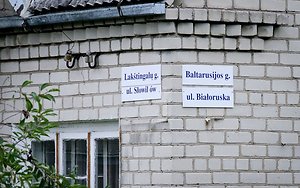- 2013/11/04
The case of bilingual street signs once again

 The campaign against bilingual street signs is still on. The Foundation has numerously informed about the many steps (including courts) of various national institutions (especially the National Language Inspectorate) aiming to remove street signs with the names of streets in the Polish language, which are common in areas densely populated by the Polish national minority in Lithuania.
The campaign against bilingual street signs is still on. The Foundation has numerously informed about the many steps (including courts) of various national institutions (especially the National Language Inspectorate) aiming to remove street signs with the names of streets in the Polish language, which are common in areas densely populated by the Polish national minority in Lithuania.
The new decision of the Vilnius District Court, announced on October 28th, about the case of bilingual signs with street names, is a punishment of a director of Administration of the Self-Governing Body of the Vilnius Region with the fine of 2 thousand Litas for reversing the Court’s decision about the removal of the signs, implemented in 2011.
If the sentence from September 30th will not be executed in the Šalčininkai District Municipality and the bilingual street signs will still be used, the administration of the Šalčininkai District may have a comparable punishment for evading the court’s decision. The existence of bilingual signs is registered by the plenipotentiary of the Government, who makes a list of addresses of buildings on which the signs appear.
However, it is worth to remind that the Vilnius District Court can hold the self-government liable only, and not the citizens. Thus, such actions of the plenipotentiary may cause a feeling of insecurity and fear of financial fines among inhabitants. EFHR would like to highlight that actions aiming to intimidate inhabitants and force them to remove the signs are against the law.
To recall – on January 29th this year, the Administrative Court of Vilnius announced that the administration of the self-governing body of the Šalčininkai District ought to meet the demands of the applicant – the plenipotentiary of the Government for the Vilnius County. The applicant demanded the signs on the territory of the Self-government of the Šalčininkai District that do not meet the requirements of an act on national language and the rules of naming, changing and expiring to the register of names of streets, buildings and other items. The Administrative Court of Vilnius demanded that the administration of the self-government fulfills the orders of the applicant – leave the street signs only in Lithuanian.
Having examined the case, the Board of the Court arrived at the conclusion that the director of the Self-government’s Administration of the Šalčininkai District unlawfully and unjustifiably ignored the demands of the plenipotentiary to change the double street signs according to the Act on national language within a month since the date of the decision coming into effect. The decision includes streets in the following towns in the Šalčininkai District Municipality: Kalesninkai, Daugidonys, Purvėnai, Mantviliškės, Eišiškės, Dieveniškės, Jašiūnai, Żegaryń, Turgeliai, Šalčininkėliai, Tetėnai, Baltoji Vokė, Rudninkai.
The decision is analogous to the decision of the Chief Administrative Court from July 8th, 2011, in the case of the Self-government Body of the Vilnius Region. The decision was held by the Court of Appeal and came into force. The Administration of the Self-government of the Šalčininkai District did not agree with the decision of the Administrative Court of Vilnius from January 28th, arguing that the above decisions concern different parties.
A possible interpretation of the decision in the way that it is concerning the already mentioned owners of the buildings means that it also includes all similar situations and thus concerns an unrestricted number of people (is abstract and common) and it would mean that it undermines the law of the country and is contradictory to the Article 6 of the Convention for the Protection of Human Rights and Fundamental Freedoms, which guarantees the right to a fair trial. Moreover, it would be against the Article 97 of the Administrative Procedure Code, according to which the decision, coming into force ought to be executed by the subject, whose actions or omissions were appealed against.
In such a situation, the Šalčininkai District Self-government is of an opinion that the administrative decision, which was a subject of the debate of the Court, concerns only the territories (houses, building, etc.) which are subjects to the District, and does not apply to private properties and the Self-Government Body does not have any right to remove them.
On September 30th, the Lithuanian Chief Administrative Court did not agree with the arguments of the Šalčininkai District Self-government and put into effect the Vilnius Administrative Court’s decision dated January 28th. The court decided that the Act on National Language unequivocally stipulates that street and town signs ought to be written in Lithuanian, because bilingual signs in the Šalčininkai District are against the law and ordered government officials to remove the signs. The decision is final and non-actionable.
In its programme, the government of the prime-minister Algirdasa Butkevičiusa declared to “decide on the issue of spelling of surnames and bilingual naming of streets”, however the Act on National Minorities, which includes the resolution of the problem, has not reached the Parliament yet.
After announcement of the court’s decision, the Foundation expressed its standpoint on the case. It does not agree with the decision and, because it is against the international law, in force in Lithuania. The Foundation has declared to help, free of charge, in legal matters all those who are holders of bilingual signs, including representation in courts, both national and international.
EFHR



